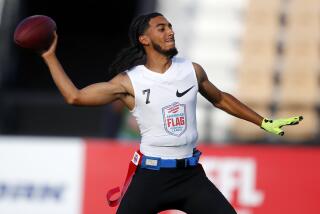President Doesn’t Play Favorites, or Underdogs Either, for That Matter
- Share via
WASHINGTON — President Reagan joined in the televised hoopla for Super Bowl XX with recollections of his football days on the gridiron and silver screen and a politically proper fence-straddling position on the outcome.
“I’m just going to say, may the best team win,” Reagan said in an interview aired live by NBC as part of the pregame warmup to the showdown between the Chicago Bears and New England Patriots.
Appearing before perhaps the largest audience in television history at the start of a busy week of presidential salesmanship, Reagan reminisced with NBC News anchorman Tom Brokaw about his exploits as a guard for the Eureka College Golden Tornadoes and his starring role as the great Notre Dame running back George Gipp in the 1940 film “Knute Rockne--All American.”
Brushing aside a question about deficits and taxes at the end of the eight-minute interview, Reagan said he would be watching the game “and remembering football much more vividly than you normally do.”
“It all comes back and you find yourself kind of remembering what the cleats felt like under your shoes,” he said.
The president said his old Eureka Coach Ralph McKenzie was “probably” correct when he described the young Reagan as an eager, aggressive player who was better on defense and “overall an average football player but an outstanding talker.”
However, the 74-year-old president also noted he played an average of all but two minutes of every game in his three years on the varsity.
Clad in a red sweater, Reagan praised the Patriots as a comeback team and said his fondness for Chicago was shaped by “a close personal friendship” with the late Chicago owner George Halas.
His only critical words were directed at the hundreds of millions of dollars riding on the outcome in underground wagers.
“When it gets up to that kind of money, there is too much temptation to fix things,” he said. “And human nature, being what it is, we know from past history that sometimes they get away with it.”
His prowess as a swimmer and performance on the football field helped Reagan finance his way through small Eureka College in Illinois during the Depression. He often recalls his days on the line for the Eureka team, as well as his subsequent years as a sportscaster in Iowa, which eventually propelled him to Hollywood.
The interview was in lieu of the traditional televised postgame telephone call to the winning coach--a chaotic scene some White House aides came to regard as an embarrassment to the president.
With the Super Bowl expected to attract an audience of perhaps 115 million Americans and advertisers paying as much as $550,000 for a 30-second commercial, White House strategists saw the interview as an opportunity for the widest possible presidential exposure.
More to Read
Go beyond the scoreboard
Get the latest on L.A.'s teams in the daily Sports Report newsletter.
You may occasionally receive promotional content from the Los Angeles Times.










